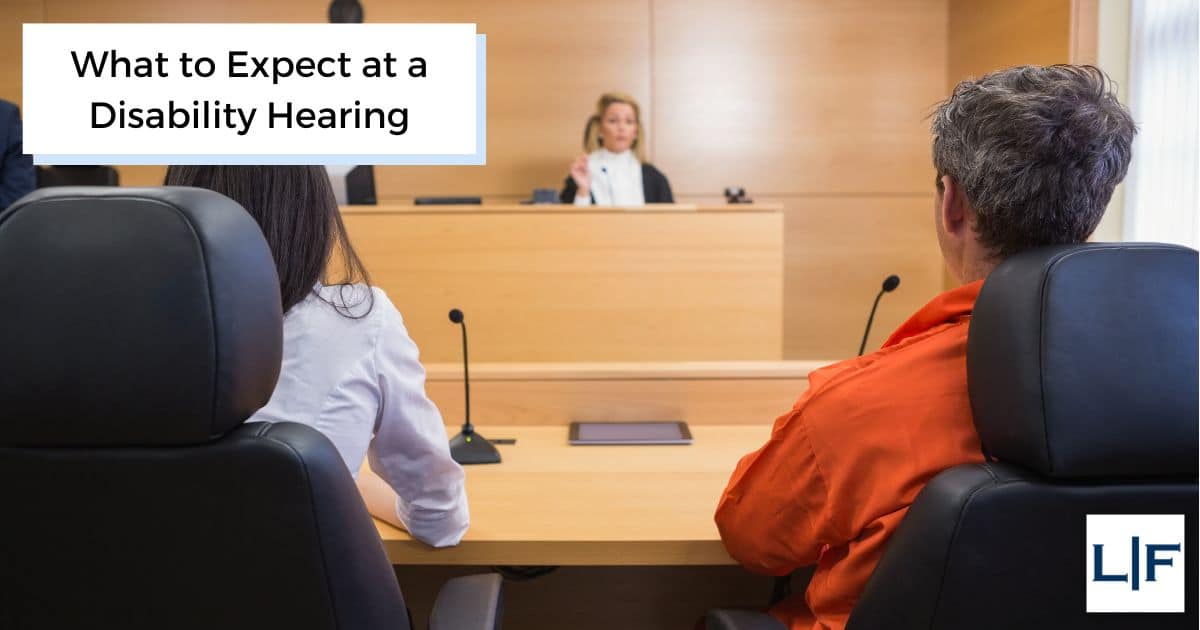One of the most common questions our clients have once we have filed a Request for Hearing, is what to expect at a disability hearing. Most of them have never attended a hearing for disability benefits before and are nervous about the experience. If you have a disability attorney, they will likely be going over this type of information with you so that you can be prepared.
Disability Hearing Formats
There are four different type of disability hearings:
- In Person Hearing: You and your attorney if you have one will both be at the hearing office in the same room as the judge
- VTC Hearing: You and your disability attorney will be together at the hearing office or in a remote hearing site. You will interact with the judge by video call.
- OVH Hearing: During the COVID-19 pandemic, Social Security started holding “virtual” hearings. You will be at home and use your smartphone, tablet or computer to connect to a video hearing.
- Telephone Hearing: Participating in the hearing by phone only became widely used during the pandemic and is still being used. As the name implies, you will connect and participate in the hearing through a phone call.
Disability Hearing Procedure
Once everyone is present (whether in person, by video or by phone, all hearings follow a typical format.
- The judge will make sure everyone is present and will introduce the participants.
- If you are having an OVH or telephone hearing the judge will make sure that you (and your attorney) still agree to do the hearing via phone or video. The judge will also make sure that the recording is working. The sound (but not the picture) is recorded at every hearing so that it can be referred to by the judge and attorney, as well as the Appeals Council.
- The judge will discuss some legal issues, such as making sure the file is complete, a list of outstanding medical records, the correct alleged onset date, whether the Notice of Hearing is legally sufficient, etc. If you have an attorney they will handle this for you.
- The judge will swear in everyone who will be testifying. This includes you, the vocational expert, and the medical expert. Most hearings do have a vocational expert, but a medical expert is not as commonly used. Your hearing notice indicates what type of expert(s) will be testifying at your hearing. The oath the judge has you take will sound a lot like the one that you hear on TV shows.
- Your attorney may give an opening statement if the judge asks for one. Some judges do not do this.
- The judge will take testimony from each of the witnesses, and you are almost always the first witness.
- During your testimony, you will cover your basic background information such as your age, who lives in your household, the ages of your children, your education, and your work history for the past 15 years.
- Most of the time will be spent answering questions about your physical and mental health. You will explain how your conditions affect your ability to work.
- After you are done testifying, the experts will testify by answering questions from the judge. You will also be allowed to ask questions, but if you have an attorney, they will handle asking the questions.
- Once everyone has testified, the judge will go over some of the same things from the beginning of the hearing, like a list of the records that have not arrived yet. Your attorney may also be given the opportunity to give a closing argument.
Things to Know about Disability Hearings
There are a few things you should know to help you have a positive experience at your hearing.
- Hearings are not a trial. There is no attorney representing Social Security to cross-examine you or make objections.
- Hearings tend to be short. Most last about an hour, although in some complicated cases, that may last up to two hours.
- Because hearings are short, it is important that you stay focused on the questions being asked of you. If you start talking about other things, then there may not be enough time to cover the important information the judge needs to have to be able to make a decision about your claim.
- Dress appropriately for your hearing. You do not need to be dressed up like you are going to church or out to a fancy dinner. However, you should not wear shorts, tank tops, low-cut shirts, or clothing with words or pictures on them.
- While the hearing is meant to be as comfortable for you as possible, it is still a hearing before a judge and you should show proper respect to the judge and all of the people who are present at your hearing.
- You should address the judge as “Your Honor” or answer with a “Yes Sir” or “Yes Ma’am”. You may forget occasionally, and that will be ok.
- Try to say yes and no, rather than “yep, nope, nah” or just by shaking your head. Remember, the hearing is being recorded, and those types of answers cannot be recorded.
- If you are having an OVH hearing, make sure you follow the directions in the email you receive regarding downloading the app to your phone or setting up the software on your computer. Hearings are done through MSTeams, which is a free phone app and also free to download to a computer.
Do I Need a Disability Attorney at My Hearing?
First, you are never required to have an attorney represent you at any stage of your claim. You have the right to represent yourself. However, it is often best to have representation. Our disability attorneys handle gathering medical records, preparing a legal theory as to why a claimant is entitled to benefits, as well as questioning their client and the experts at the hearing.
You should not wait until the hearing is scheduled to find an attorney. Attorneys need enough time to prepare your case for hearing, including obtaining medical records, which can take a long time. Attorneys are also scheduled for other hearings, and it may be difficult for you to find one that can attend the hearing.
Ideally, you would hire an attorney at the beginning of your claim. However, if you want representation at the hearing, you should start looking for one as soon as you file the Request for Hearing.
If you live in North Carolina and need help with your disability hearing, please contact us today. The sooner you reach out to us, the sooner we can start working on preparing the file and you for your disability hearing.







